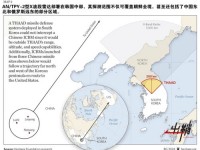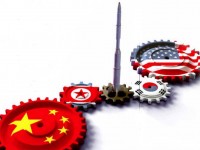AP, The Associated Press
Sep 12, 2016
China says the United States has inflamed the conflict on the Korean Peninsula and must carry the burden of ending it in the wake of North Korea's fifth nuclear test.
Sep 12, 2016
North Korea is ready to conduct an additional nuclear test at any time, South Korea's Defence Ministry said on Monday, three days after the reclusive North's fifth test drew widespread condemnation.
CNN,
Sep 09, 2016
North Korea has hit the button on its fifth and potentially most powerful nuclear test, claiming to have successfully tested a nuclear warhead.
Darcie Draudt, non-resident James A. Kelly Korean Studies fellow, Pacific Forum CSIS
Sep 02, 2016
In early July, South Korea decided to allow the United States to deploy the Terminal High-Altitude Area Defense (THAAD) system. At the heart of this issue is the difference in how China and the United States view the role of South Korea and decisions related to the security and stability of the peninsula.
AP, The Associated Press
Aug 24, 2016
The foreign ministers of China, Japan and South Korea put aside frictions over territorial disputes and wartime history to sharply criticize North Korea's latest submarine missile test on Wednesday in a rare display of unity.

Richard Weitz, Senior Fellow, Hudson Institute
Aug 10, 2016
Following months of assessment by a Joint Working Group, the U.S. Defense Department announced in July that the U.S. Forces Korea Command will station a Terminal High-Altitude Area Defense (THAAD) battery in South Korea “as a defensive measure to ensure the security of the nation and its people, and to protect alliance military forces from North Korea's weapons of mass destruction and ballistic missile threats.”

Fan Gaoyue, Guest Professor at Sichuan University, Former Chief Specialist at PLA Academy of Military Science
Aug 09, 2016
Seoul should fully understand the consequences of THAAD in the ROK, reverse the deployment decision and cooperate with countries concerned in an effort to force the DPRK to abandon its nuclear project and mitigate the tense situation in the Korean Peninsula. THAAD will only produce two winners: the U.S. and the DPRK.

Richard Weitz, Senior Fellow, Hudson Institute
Jul 26, 2016
The U.S. Defense Department recently announced that the U.S. Forces Korea Command will station a Terminal High-Altitude Area Defense (THAAD) battery in the Republic of Korea (ROK) as a defensive measure against North Korea. But Russian and Chinese representatives have expressed concern about how THAAD could affect strategic stability, alliance relations, and global influence.

He Yafei, Former Vice Minister of Foreign Affairs
Jul 22, 2016
The missile-defense deployment will worsen the bifurcation in East Asia, where regional arrangements for economic growth are shaped with China at its core while regional security architecture is set up with the US-centered military alliances as its foundation. Should this contradictory situation evolve, neither regional economic growth nor security could be sustained.

Shi Yinhong, Professor, Renmin University
Jul 13, 2016
China must keep in mind its significant interests in multiple aspects of the North Korea issue, as it tries its best to balance such interests under difficult circumstances and create conditions for improving China-DPRK ties while preserving its mutual security and stability goals with Washington and Seoul.
Back to Top

- China-US Focus builds trust and understanding between the U.S. and China through open dialogue among thought leaders.
- Our Offerings
- Topics
- Videos
- Podcasts
- Columnists
- Research Reports
- Focus Digest
- Stay Connected
-
Thanks for signing up!
- Get the latest stories from China-US Focus weekly.